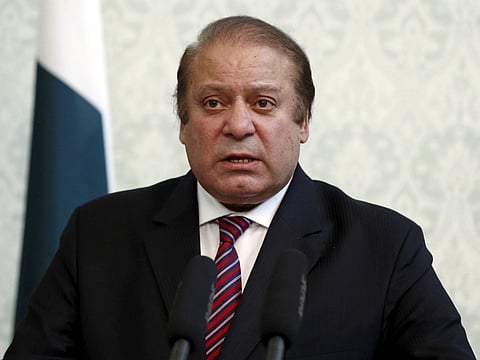Pakistan’s foreign policy pitfalls
The inadequacies in the Foreign Office appear to be in sync with Prime Minister Nawaz Sharif’s way of running government, where short-term expediencies continue to dominate long-term interests

In the three years since Nawaz Sharif came to power for the third time as Pakistan’s Prime Minister, the paucity of a foreign policy team and a lack of focus have been all too evident.
Granted that Pakistan’s influential army plays a key role in formulating the South Asian country’s foreign policy. Yet, the failure of Sharif during his tenure to contribute towards giving a badly-needed coherence to Pakistan’s foreign policy, has only exposed a wider failure. As things stand right now, Sharif has hardly set the pace for elected politicians to take a more comprehensive charge of foreign policy in the future.
Take the case of the Foreign Ministry in Islamabad, housed in the once-magnificent hotel Scheherazade before the facility was nationalised. Known as the ‘foreign office’ — an expression drawn from typical British diplomatic service lingo — the ministry is yet to witness the appointment of a full-time foreign minister. Today, the foreign-policy show has been assigned to Sartaj Aziz, an octogenarian and an economist by training and experience who remains in place as the ministerial-level adviser on foreign policy and national security, alongside Tareq Fatemi, a former Pakistani diplomat and the de facto junior foreign minister. The arrangement has ended up causing more confusion across the Foreign Office, dividing the rank and file.
At best, these arrangements smack of continuing ad-hocism instead of a more permanent structure to promote Pakistan’s best interests. The glaring gaps should hardly be surprising as they have been all-too-evident recently as Pakistan sought to confront some of its key foreign policy challenges.
Just in the past week, intensified exchange of fire between Afghan and Pakistani troops along the border triggered widespread anxieties over already frosty ties between the two neighbours. But behind the scenes, it was apparent that key western countries, led by the United States, with a long-standing interest in both Afghanistan and Pakistan, sought to reach out primarily to Pakistan’s Army Chief General Raheel Sharif to help promote a truce rather than the Foreign Ministry in Islamabad.
A more telling recent case came up in relation to Pakistan’s attempt to seek membership of the elite Nuclear Suppliers’ Group (NSG), wherein, it was publicly highlighted that General Sharif was the key foreign policy figure. Within hours of key ministers being summoned to meet General Sharif at the army headquarters to discuss a host of issues, including NSG, the Foreign Office sprung into action after being in slumber for days.
It was mainly after the meeting chaired by General Sharif that Aziz felt compelled to reach out to foreign ministers of a host of countries to seek their support for Pakistan’s case. Though gaining the NSG membership remains an unlikely prospect, unless both Pakistan and India are allowed simultaneous entry, the difference between a barely-active foreign office — before the meeting chaired by General Sharif — and a pro-active one afterwards, was all too obvious.
Uncomfortable questions
Meanwhile, without a full-time foreign minister, the idea of seeking the parliament’s backing to build a national political consensus on vital issues remains a half-baked objective. Across Pakistan, there simply isn’t a powerful champion representing the government to build a national consensus among ordinary folks on matters to do with foreign policy.
The inadequacies in the Foreign Office appear to be in sync with Sharif’s way of running his government where short-term expediencies continue to dominate long-term interests. Since late last month, Sharif has been in London, where he underwent open-heart surgery and is now recuperating. His absence from Pakistan has triggered uncomfortable questions over exactly how the business of the state ought to be run without the prime minister.
It was only after Sharif’s departure that Pakistan’s media began raising the question of there being no provision in the constitution for the prime minister to continue holding charge of the government while also being indisposed. Rather than tackle what indeed appeared to be a major constitutional complication, Sharif took an unprecedented step. For the first time in Pakistan’s history, he chose to preside over a cabinet meeting via Skype to approve this years’ annual budget.
Though Sharif’s style of government remains a debatable one, his future has additionally been saddled with harsh recent controversy. Revelations in the form of the so-called “Panama leaks” have exposed large-scale wealth belonging to his three children, stashed away in offshore companies and subsequently used for the purchase of expensive property in central London.
To date, no credible paper trail has been presented in public, either by Sharif or any of his family members, to prove that taxes were fully paid for the funds that had ended up in the United Kingdom.
And last, but not the least, Sharif’s choice of receiving his medical treatment in the UK for a procedure that is widely performed in Pakistan, has exposed him to criticism over his loss of confidence in his home turf. Taken together, the popular faith in Sharif’s leadership ability only continues to slip southwards.
Against this background, Pakistan’s foreign policy apparatus suffers from two major gaps. First, the absence of a full-time foreign minister does not only highlight Sharif’s failure to appoint an individual to take charge of a key area, which is central to the country’s national interests. More importantly, this gap also highlights the prime minister’s blatant disregard for the need to move swiftly in preparing his country’s foreign policy to meet challenges all around.
Secondly, questions related to Sharif, ranging from his health to matters tied to his family’s overseas wealth, have deeply undermined his credibility. Consequently, any Pakistani is now within his or her right to ask if indeed the prime minister is fit to rule and take decisions on key policy issues.
Farhan Bokhari is a Pakistan-based commentator who writes on political and economic matters.


